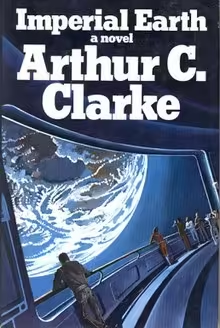
Imperial Earth is a 1975 science fiction opus by British luminary Sir Arthur C. Clarke. The narrative centers on Duncan Makenzie, a descendant of Titan’s pioneering lineage. Set in the year 2276, the novel chronicles Duncan’s sojourn to Earth from Titan, Saturn’s enigmatic moon. This expedition serves multiple purposes:
- Representing Titan at the quincentennial celebration of United States Independence.
- Initiating the creation of a clone to perpetuate his lineage.
- Seeking a novel economic trajectory for Titan as technological strides threaten its hydrogen-centric economy.
The novel forecasts innovations such as personal computing devices, mobile apparatuses, and a global information nexus. However, Clarke’s projections falter in certain respects. He conceives these devices as cumbersome and bureaucratic, failing to anticipate consumer capitalism’s influence on technological design. For instance, Clarke envisages 23rd-century denizens employing command prompts on their handheld devices.
Human Ingenuity and Adaptation in “Imperial Earth”
In Arthur C. Clarke’s Imperial Earth, technology emerges as an indispensable catalyst enabling interstellar voyages and the colonization of distant worlds. Clarke underscores humanity’s inventiveness in engineering advanced technologies—such as asymptotic drives energized by infinitesimal black holes—that make traversing expansive cosmic distances feasible. This narrative accentuates the intrinsic bond between human progression and technological innovation.
Clarke presents Titan as a testament to humanity’s adeptness at acclimating to formidable environments. The moon’s economy thrives on the extraction and commerce of hydrogen, a vital propellant for interplanetary spacecraft. This reliance on technological prowess highlights how humanity capitalizes on scientific breakthroughs to prosper in uninhabitable realms.
The novel delves into potential societal and cultural transformations accompanying technological advancements. It envisions a future less preoccupied with wealth accumulation and characterized by heightened social parity. However, some critics note that Clarke’s conjectures about the internet and personal devices were notably imprecise, emphasizing the challenges inherent in forecasting technological trajectories.
While the novel contains some forward-thinking ideas, it can also feel outdated at times, especially in its portrayal of user interfaces and information access, highlighting the challenges of predicting technology’s impact on society..
Ultimately, Imperial Earth paints a portrait of humanity’s ambition and adaptability in a future where cosmic travel is commonplace. It emphasizes technology’s pivotal role in extending human reach and shaping societal evolution. The narrative also highlights the ethical and social contemplations that arise alongside technological progress, prompting reflection on the interplay between humanity and its creations.
Clarke’s Vision of the Future
A striking facet of Imperial Earth is its exploration of a future Earth replete with social and technological advancements. Clarke envisions a world where:
- Public officials are selected arbitrarily from a pool of qualified candidates, ensuring those coveting power are deemed unsuitable to wield it.
- Vehicles operate autonomously.
- The profit motive has become obsolete.
Themes and Criticisms
Cloning and Reproduction: The narrative probes the ethical and societal ramifications of cloning, with Duncan himself being a clone endeavoring to create another. A reviewer highlights a disconcerting aspect: surrogate mothers volunteer due to a desire for offspring, yet the implication that many possess developmental disabilities raises ethical concerns about their capacity for informed consent and comprehension of the arrangement.
Love and Relationships: A substantial portion of Imperial Earth revolves around Duncan’s personal relationships. His enduring affection for Calindy, a companion from his youth, drives much of the storyline. The novel also explores the intricate dynamics between Duncan and Karl Helmer, his childhood confidant and erstwhile lover.
The Search for Extraterrestrial Life: Clarke touches upon humanity’s quest for alien intelligences, particularly through constructing an immense radio telescope intended to detect signals from distant civilizations.
Environmentalism: The novel examines the tension between technological advancement and environmental stewardship. Clarke depicts Titan’s unique ecosystem and envisions a future Earth where advanced civilization coexists with rejuvenated wilderness. However, one critic deems Clarke’s environmental predictions somewhat superficial, suggesting the work primarily serves as “advocacy for space exploration and technological innovation.”
Overall Reception and Significance
Imperial Earth has elicited mixed appraisals, with some lauding Clarke’s scientific sagacity and others finding the plot and character development wanting. Certain critics commend his ability to fabricate plausible future societies and dissect multifaceted themes like cloning and the pursuit of extraterrestrial life. Conversely, others censure the novel for its tepid plot, unconvincing personas, and anticlimactic resolution.
Despite these critiques, Imperial Earth remains pivotal in Clarke’s repertoire. The novel exemplifies his capacity to intertwine thought-provoking concepts within engaging narratives, even if execution occasionally wavers. Ultimately, it offers a vista into a conceivable future, prompting contemplation on technological progress’s implications and enduring questions about humanity’s place in the cosmos.
“Imperial Earth”: A More Intimate and Personal Exploration
While Arthur C. Clarke is revered for monumental science fiction epics like 2001: A Space Odyssey and Rendezvous with Rama, Imperial Earth distinguishes itself as a more intimate, character-driven chronicle. Reviewers liken the novel to a theatrical production, emphasizing its focus on human relationships and internal dilemmas over grand cosmic events.
One critic describes Imperial Earth as “unexpectedly romantic,” noting its introspective quality. In contrast to Clarke’s other works, which often delve into “first contact” scenarios with alien entities, this novel contemplates the possibility that humanity may remain solitary in the universe. This paradigm shift allows Clarke to explore the intricacies of human nature and the nuances of our future in a grounded, personal context.
Another defining element is the exploration of political and social structures in a future where space travel is ubiquitous. Instead of spotlighting technological marvels, Imperial Earth scrutinizes the evolution of governance and power dynamics. The narrative portrays Earth with a distinctive political system wherein public servants are chosen by lot from qualified individuals, aiming to preclude power-seekers from assuming office. This emphasis invites readers to consider alternative governance models and their societal ramifications.
The ethical complexities of cloning and familial bonds are also central themes. Duncan Makenzie, as a clone seeking to continue this practice, embodies both the scientific possibilities and moral quandaries of cloning technology. The unsettling notion of surrogate mothers volunteering due to a yearning for children—amid implications of developmental disabilities—raises profound ethical questions about autonomy and consent. This focus on personal repercussions differentiates the novel from Clarke’s more action-oriented sagas.
Despite its futuristic setting, Imperial Earth maintains a sense of realism that contrasts with the expansive scopes of works like 2001 or Rendezvous with Rama. Clarke details the challenges of acclimating to Earth’s gravity after residing on Titan, the logistical intricacies of spacefaring, and even mundane aspects of quotidian life in a future society. This meticulous attention to detail, while occasionally less thrilling, imbues the narrative with authenticity, rendering the speculative world tangible and relatable.

